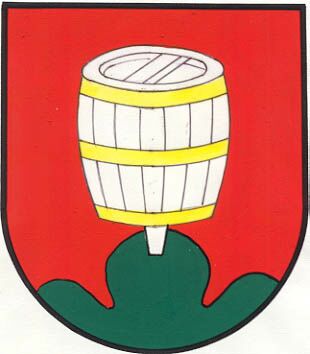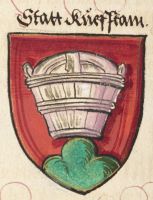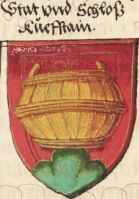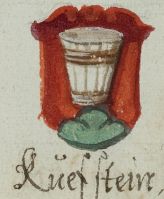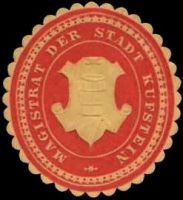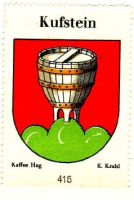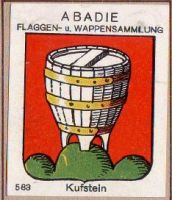Kufstein: Difference between revisions
Knorrepoes (talk | contribs) m (Text replacement - "====Official blazon====" to "===Official blazon===") |
Knorrepoes (talk | contribs) m (Text replacement - "{{at}}↵↵'''" to "'''") Tags: Mobile edit Mobile web edit |
||
| (14 intermediate revisions by the same user not shown) | |||
| Line 1: | Line 1: | ||
'''KUFSTEIN''' | '''KUFSTEIN''' | ||
| Line 6: | Line 4: | ||
District : Kufstein | District : Kufstein | ||
[[File:kufstein.jpg|center|Wappen von {{PAGENAME}}]] | [[File:kufstein.jpg|center|alt=Wappen von {{PAGENAME}}/Arms (crest) of {{PAGENAME}}]] | ||
= | {| class="wikitable" | ||
|+Official blazon | |||
|- | |||
|'''German''' | |||
| blazon wanted | |||
|- | |||
|'''English''' | |||
| blazon wanted | |||
|} | |||
===Origin/meaning=== | ===Origin/meaning=== | ||
The arms are first seen on the local seal of Kufstein dating from 1376. The seal showed a canting Kufe, or salt barrel, above some mountains rising from some waves. The barrel obviously was chosen as a canting symbol and a symbol for the salt mining in the area. The mountains and waves are symbols for the surroundings. During later centuries the waves disappeared and the mountains gradually changed into the present mountain. | The arms are first seen on the local seal of Kufstein dating from 1376. The seal showed a canting Kufe, or salt barrel, above some mountains rising from some waves. The barrel obviously was chosen as a canting symbol and a symbol for the salt mining in the area. The mountains and waves are symbols for the surroundings. During later centuries the waves disappeared and the mountains gradually changed into the present mountain. | ||
===Image gallery=== | |||
| | <gallery widths=250px heights=200px perrow=0> | ||
File:Kufstein1500.jpg|alt=Wappen von Kufstein/Arms (crest) of Kufstein|The arms around 1500 (silver) | |||
File:Kufstein1500a.jpg|alt=Wappen von Kufstein/Arms (crest) of Kufstein|The arms around 1500 (gold) | |||
File:Kufstein16.jpg|alt=Wappen von Kufstein/Arms (crest) of Kufstein|The arms in a [[:Category:Windhag city arms|16th century manuscript]] | |||
File:kufsteinz1.jpg|alt=Wappen von Kufstein/Arms (crest) of Kufstein|Seal from around 1900 | |||
File:kufstein.hagat.jpg|alt=Wappen von Kufstein/Arms (crest) of Kufstein|The arms in the [[Kaffee Hag : Die Wappen der Republik Oesterreich|Coffee Hag album]] +/- 1932 | |||
File:0583.aba.jpg|alt=Wappen von Kufstein/Arms (crest) of Kufstein|The arms in the [[Abadie]] albums | |||
File:Kufstein60.jpg|alt=Wappen von Kufstein/Arms (crest) of Kufstein|Municipal stationery, 1960s | |||
</gallery> | |||
| | [[Civic Heraldry Literature - Austria|'''Literature''']]: Köfler and Beimrohr, 1995 | ||
{{media}} | {{media}} | ||
[[Category:Austrian Municipalities K]] | [[Category:Austrian Municipalities K]] | ||
[[Category:Tirol]] | [[Category:Tirol]] | ||
[[Category:Kufstein]] | [[Category:Kufstein]] | ||
Latest revision as of 05:44, 27 September 2023
KUFSTEIN
State : Tirol
District : Kufstein
| German | blazon wanted |
| English | blazon wanted |
Origin/meaning
The arms are first seen on the local seal of Kufstein dating from 1376. The seal showed a canting Kufe, or salt barrel, above some mountains rising from some waves. The barrel obviously was chosen as a canting symbol and a symbol for the salt mining in the area. The mountains and waves are symbols for the surroundings. During later centuries the waves disappeared and the mountains gradually changed into the present mountain.
Image gallery
The arms in a 16th century manuscript
The arms in the Coffee Hag album +/- 1932
The arms in the Abadie albums
Literature: Köfler and Beimrohr, 1995
Contact and Support
Partners:
Your logo here ?
Contact us
© since 1995, Heraldry of the World, Ralf Hartemink
Index of the site
